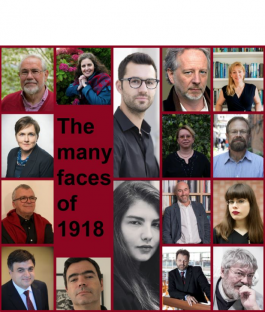novembre 2018
20nov19:0021:00The Many faces of 1918 - Lectures et entretien

Détails de l'événement
Il existe de nombreux récits différents sur l’année 1918 en Europe : les uns la voient comme l’année fatidique, qui s’accompagne du déclin et de la destruction, les autres comme l’année
Plus
Détails de l'événement
Il existe de nombreux récits différents sur l’année 1918 en Europe : les uns la voient comme l’année fatidique, qui s’accompagne du déclin et de la destruction, les autres comme l’année de la libération et de la victoire. Toutefois, il peut aussi exister des avis divergents même à l’intérieur d’un seul pays, et cette année 1918 représente bien une période décisive : un petit intermède entre deux guerres mondiales ou enfin la paix ? Tous ces points de vue et idées sont recevables, et il faut d’abord comprendre ces différences pour ensuite espérer appréhender l’Europe. 17 pays ont élaboré ensemble une anthologie portant le titre « The many faces of 1918 » pour observer ces perceptions nationales. 17 auteurs montrent dans leur langue maternelle différents aspects de l’année 1918. Tous les textes s’accompagnent aussi d’une version anglaise. Ce livre commun sera présenté à l’IPW à travers des lectures et un entretien entre les auteurs. Les écrivains participants: Claudio Cicotti, Frederika Amalia Finkelstein, Aleksandar Gatalica, Miguel Bandeira Jeronimo, André Link, Sinéad McCoole, Ioan T. Morar und Guillaume Rihs.
Les écrivains ayant contribué au projet :
Miguel Bandeira Jeronimo, Theodora Bauer, Prof. Dr. Gökhan Çetinsaya, Justyna Chlap-Nowakowa, Claudio Cicotti, Ruth Dugdall, Frederika Amalia Finkelstein, Aleksandar Gatalica, Germaine Goetzinger, Stefan Hertmans, Hauke Kracht, André Link, Sinéad McCoole, Christopher Merrill, Ioan T. Morar, Guillaume Rihs, Anna Sochova, Géza Szocs
En anglais
Entrée libre
Prière de s’inscrire, par téléphone au +352 490 443 1 ou par email à info@ipw.lu
The year 1918 is seen very differently in many of the countries represented by embassies in Luxembourg and Luxembourg itself. In some countries it stands for defeat, the beginning of a civil war, in other countries it represents a loss, for some it equals liberation, victory, albeit perhaps a Pyrrhic victory. In some cases even different points of view may co-exist within one country (e.g. defeat but also democratization, new states based on the idea of self-determination, but only for a part of the population).
Publicists also describe the events in a mixed manner, their analyses range from “peace at last“ to, at best, “a short break during the 30 years of civil war in Europe”. Particularly bearing in mind how differently 1914 was commemorated in the various countries, it becomes obvious how much the focus shifts depending on the national point of view.
Especially World War I is characterized by completely opposing and parallel narratives. However, Europe can only be understood if these divergent narratives are permitted and allowed to co-exist. Europe does not need one single interpretation of history but a fruitful co-existence of different views and opinions. That is why 17 countries represented in Luxembourg have decided – on initiative of the Austrian Embassy – to creatively portray this diversity by an international anthology. The following countries participate: Austria, Belgium, Czech Republic, France, Germany, Hungary, Ireland, Italy, Luxembourg, Poland, Portugal, Romania, Serbia, Switzerland, Turkey, United Kingdom and United States
Every participating country has chosen an author to produce a short text (not more than five pages) which reflects the national view of the year 1918. The texts have been translated (into English) and will be published together in an anthology. The result is astounding: a salmagundi of literary texts – be it short stories, be it essays – that shows exactly the multitude of possibilities on how to approach 1918. The well-known Luxembourgish writer Germaine Goetzinger has written a short introduction to this anthology.
The presentation of the publication is planned on November 20th 2018 in neimenster as a cooperation of all participating countries with Institut Pierre Werner. Some writers will be invited to Luxembourg, either for reading excerpts from their text or for participating in a round table to discuss their approach to 1918. An electronic version will ensure further distribution.
Organisé par l’Institut Pierre Werner en coopération avec le Ministère de la Culture du Luxembourg et les ambassades d’Allemagne, d’Autriche, de Belgique, des Etats-Unis, de France, de Grande-Bretagne, de Hongrie, d’Irlande, d’Italie, de Pologne, du Portugal, de la République tchèque, de Roumanie, du Royaume-Uni, de Suisse, de Serbie et de Turquie.
Avec le soutien de neimënster et de la Fondation Indépendance BIL
Heure
(Mardi) 19:00 - 21:00

Recent Comments